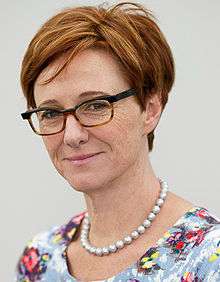Fiona Stewart (author)
Fiona Stewart (born 15 May 1966) is an Australian lawyer, sociologist, author and former executive director of the pro-euthanasia group Exit International (2004-7). She is author of Killing Me Softly: Voluntary Euthanasia and the road to the Peaceful Pill and co-author of The Peaceful Pill Handbook (eHandbook version). Stewart authored the Peaceful Pill Handbook series.
Fiona Stewart | |
|---|---|
 Dr Fiona Stewart | |
| Born | 15 May 1966 Melbourne |
| Occupation | Author and euthanasia campaigner |
| Nationality | Australian |
| Education | Monash University (B.A.) La Trobe University (M.A., Ph.D.) CDU (LL.B) |
| Subject | Generation X, Feminism, Euthanasia |
| Spouse | Philip Nitschke |
| Website | |
| Exit International | |
Early life and career
Fiona Stewart was born in Melbourne, Australia in 1966. She was educated at Lauriston Girls' School.[1] She received her BA from Monash University in 1987 followed by a Graduate Diploma in Public Policy (Melbourne University) in 1992, Master of Policy and Law (La Trobe University) in 1994 and her Ph.D. in health sciences from Latrobe in 1998. She graduated from Charles Darwin University Law School in 2015. From 1997 to 1999 Stewart held a postdoctoral fellowship at Deakin University for the study of ‘Womens Lives: Choice, Change and Identity’.[2] When her contract was not renewed, she turned to writing opinion columns for the media on Generation X and feminism.[3]
Prior to working with Nitschke on The Peaceful Pill eHandbook and in Exit International,[4] Stewart worked as an opinion writer for The Age, The Australian and other Australian papers and media outlets,[5][6] and as an online learning consultant with Professor Dale Spender.[7][8]
In 2001, Stewart founded the consumer complaints website Notgoodenough.org,[9][10] where she was active in promoting the consumer standpoint and criticising big businesses such as Telstra, the national carrier.[11]
She has participated widely in Australian public debate on varied current affairs issues.[3][12]
Euthanasia
| Part of a series on |
| Euthanasia |
|---|
| Types |
| Views |
| Groups |
| People |
| Books |
| Jurisdictions |
| Laws |
| Alternatives |
| Other issues |
Fiona met euthanasia activist Philip Nitschke at the Brisbane Festival of Ideas in 2001 during the Late Night Live debate ‘There’s no such thing as a new idea’.[13] The couple married in Las Vegas in 2009.
In the 2014 Victorian election she stood for the Upper House for the Voluntary Euthanasia Party.[14]
Books
Stewart is the author of three books:
- Internet Communication and Qualitative Research; Sage, 2000 (With Dr Chris Mann)[15]
- Killing Me Softly: Voluntary Euthanasia and the road to the Peaceful Pill; Penguin, 2005
- The Peaceful Pill Handbook series
References
- "Lathams Alumni Hit List". Retrieved 5 October 2015.
- "Simone De Beauvoir and Generations of Feminists". Retrieved 5 October 2015.
- "Generation Xcluded". Retrieved 5 October 2015.
- "Philip Nitschke's wife, Fiona Stewart, on being the 'woman behind the man'". Retrieved 5 October 2015.
- "Swimming Upstream – Moira Rayner and Fiona Stewart talking feminism" (PDF). Retrieved 5 October 2015.
- "Fiona Stewart". Australian Broadcasting Corporation. Retrieved 5 October 2015.
- Stewart, Fiona; Dale (15 March 2002). "Fiona Stewart and Dale Spender". Online Opinion. Retrieved 5 October 2015.
- "e-Learning: The new challenge in education". Commonwealth Bank of Australia. Retrieved 5 October 2015.
- "Dr Fiona Stewart". Retrieved 5 October 2015.
- Griffin, Michelle (15 March 2002). "And another thing..." The Age. Retrieved 5 October 2015.
- Arnold, Wayne (30 September 2004). "In Australia, Tug of War Over Privatizing Phone Giant". New York Times. Retrieved 5 October 2015.
- "Women and Power: A Public Forum". Retrieved 5 October 2015.
- "From "Ideas At The Powerhouse" Festival in Brisbane 16-19 August, 2001". Retrieved 5 October 2015.
- "Fiona Stewart". Retrieved 5 October 2015.
- "Internet Communication and Qualitative Research". Retrieved 5 October 2015.